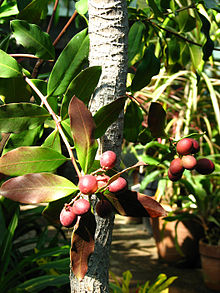| Acokanthera oblongifolia | |
|---|---|

| |
| Conservation status | |
 Least Concern (IUCN 3.1) | |
| Scientific classification | |
| Kingdom: | Plantae |
| Clade: | Tracheophytes |
| Clade: | Angiosperms |
| Clade: | Eudicots |
| Clade: | Asterids |
| Order: | Gentianales |
| Family: | Apocynaceae |
| Genus: | Acokanthera |
| Species: | A. oblongifolia |
| Binomial name | |
| Acokanthera oblongifolia (Hochst.) Benth. & Hook.f. ex B.D.Jacks. | |
| Synonyms | |
Acokanthera oblongifolia (commonly known as African wintersweet, dune poison bush, Hottentot's poison, poison arrow plant or wintersweet) is a plant in the family Apocynaceae. It grows as an evergreen shrub or small tree up to 6 metres (20 ft) tall. Its fragrant flowers feature a white tinged pink corolla. The berries are purple when ripe. Its habitat is dry forest and coastal thickets. Acokanthera oblongifolia is used in local African medicinal treatments for snakebites, itches and internal worms. The plant has been used as arrow poison. The species is native to Mozambique and South Africa.
Taxonomy
It was first described in 1844 by Christian Ferdinand Friedrich Hochstetter as Carissa oblongifolia, reassigned in 1876 to the genus, Acokanthera, by George Bentham and Joseph Hooker, but not validly, and finally, in 1895, validly published by Benjamin Daydon Jackson as Acokanthera oblongifolia.
References
- Botanic Gardens Conservation International (BGCI) & IUCN SSC Global Tree Specialist Group (2019). "Acokanthera oblongifolia". IUCN Red List of Threatened Species. 2019: e.T141549206A149506107. doi:10.2305/IUCN.UK.2019-2.RLTS.T141549206A149506107.en. Retrieved December 13, 2024.
- ^ "Acokanthera oblongifolia". World Checklist of Selected Plant Families (WCSP). Royal Botanic Gardens, Kew. Retrieved 3 August 2017.
- "Acokanthera oblongifolia". Germplasm Resources Information Network. Agricultural Research Service, United States Department of Agriculture. Retrieved 8 August 2017.
- "Acokanthera oblongifolia (Hochst.) Benth. & Hook.f. ex B.D.Jacks". Plants of the World Online. The Trustees of the Royal Botanic Gardens, Kew. n.d. Retrieved December 13, 2024.
- "Acokanthera oblongifolia (Hochst.) Benth. & Hook.f. ex B.D.Jacks". Catalogue of Life. Species 2000. n.d. Retrieved December 13, 2024.
- ^ Medicinal Plants. PROTA. 2008. pp. 29–30. ISBN 978-9-05782-204-9.
- ^ "Acokanthera oblongifolia". International Plant Names Index (IPNI). Royal Botanic Gardens, Kew; Harvard University Herbaria & Libraries; Australian National Botanic Gardens.
- Hochstetter, C.F.F (1844) Flora 27(2): 827
- Bentham, G.; Hooker, J.D. (1876). "Apocynaceae". Genera Plantarum :ad Exemplaria Imprimis in Herberiis Kewensibus Servata Definita. 2 (2): 696.
- Jacks, B.D. (1895) Index Kew. 2(2): 1262.
| Taxon identifiers | |
|---|---|
| Acokanthera oblongifolia |
|
| Carissa oblongifolia | |
This Apocynaceae article is a stub. You can help Misplaced Pages by expanding it. |